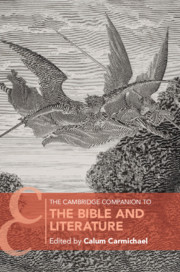Book contents
- The Cambridge Companion to the Bible and Literature
- Cambridge Companions to Religion
- The Cambridge Companion to the Bible and Literature
- Copyright page
- Contents
- Contributors
- Abbreviations
- Introduction
- 1 Literature in the Ancient Near East and the Bible
- 2 The Primary Narrative (Genesis through 2 Kings)
- 3 Reading Biblical Literature from a Legal and Political Perspective
- 4 Biblical Law and Literature
- 5 Kings, Prophets, and Judges
- 6 Prophetic Literature
- 7 Wisdom Literature
- 8 The Gospels
- 9 Paul’s Letters
- 10 Apocalyptic Literature
- 11 Shakespeare’s King Lear and the Bible
- 12 The Bible and John Milton’s Paradise Lost
- 13 The Bible, Shelley, and English Romanticism
- 14 Herman Melville and the Bible
- 15 The Song of Songs and Two Biblical Retellings
- Index
- Other Titles in the Series
- References
8 - The Gospels
Published online by Cambridge University Press: 13 March 2020
- The Cambridge Companion to the Bible and Literature
- Cambridge Companions to Religion
- The Cambridge Companion to the Bible and Literature
- Copyright page
- Contents
- Contributors
- Abbreviations
- Introduction
- 1 Literature in the Ancient Near East and the Bible
- 2 The Primary Narrative (Genesis through 2 Kings)
- 3 Reading Biblical Literature from a Legal and Political Perspective
- 4 Biblical Law and Literature
- 5 Kings, Prophets, and Judges
- 6 Prophetic Literature
- 7 Wisdom Literature
- 8 The Gospels
- 9 Paul’s Letters
- 10 Apocalyptic Literature
- 11 Shakespeare’s King Lear and the Bible
- 12 The Bible and John Milton’s Paradise Lost
- 13 The Bible, Shelley, and English Romanticism
- 14 Herman Melville and the Bible
- 15 The Song of Songs and Two Biblical Retellings
- Index
- Other Titles in the Series
- References
Summary
The essay explores the contribution of a literary analysis to interpretation of the canonical Gospels – Matthew, Mark, Luke, and John. The author begins by analyzing historical tendencies to read the biographies of Jesus atomistically, before moving to describe recent narrative approaches that focus greater attention on the overarching picture of how each story is told by means of plotting, characterization, and thematic development. The body of the essay involves two close, narrative readings, the first focused on Matt 4:23-9:38, which highlights the role of the Sermon on the Mount (Matt 5-7) and the miracle chapters (Matt 8-9) in this part of the first Gospel. The second reading addresses John’s Gospel and the ways that author deploys allusions and echoes from Gen 1-2 to accent the theme of the renewal of creation in the person and ministry of Jesus of Nazareth.
Keywords
- Type
- Chapter
- Information
- The Cambridge Companion to the Bible and Literature , pp. 131 - 148Publisher: Cambridge University PressPrint publication year: 2020

